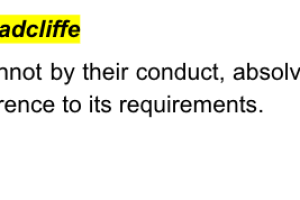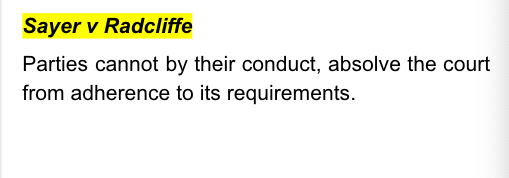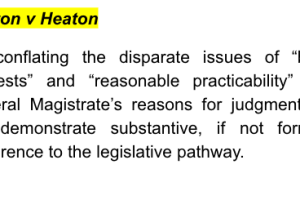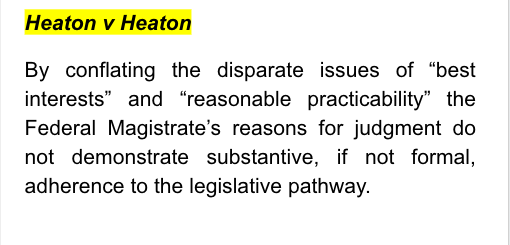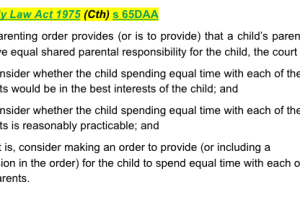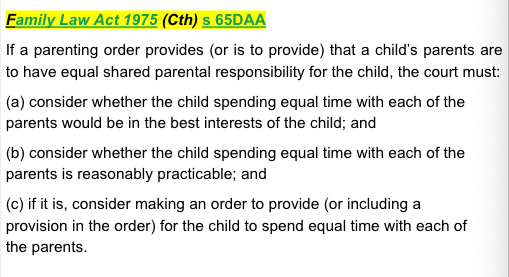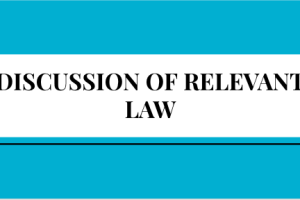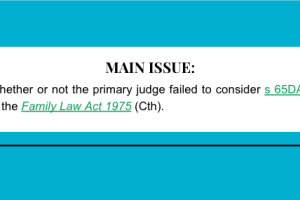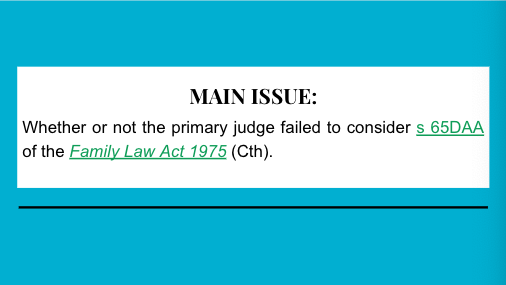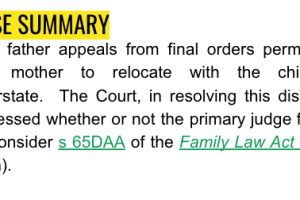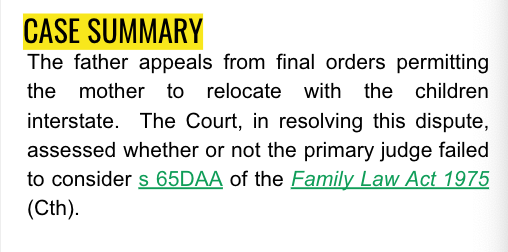- · 4784 friends
Father Appeals Relocation Orders

Loverdos & Bonner [2022] FedCFamC1A 174 (26 October 2022)

The father appeals from final orders permitting the mother to relocate with the children interstate. The Court, in resolving this dispute, assessed whether or not the primary judge failed to consider s 65DAA of the Family Law Act 1975 (Cth).

Facts
The parties commenced cohabitation in 2013. Their first child was born in 2015 and their second child in mid-2017. The parties separated in early 2017, prior to the birth of their second child, and the father sought a DNA test to establish he was her biological father. The mother commenced a relationship with Mr C by February 2017.
After separation the elder child, then aged two and a half years, spent four nights a fortnight with her father. The proceedings had initially been listed for final hearing in June 2019 but the matter was not reached. The mother’s treating clinical psychologist reported upon the effect on the mother of the delay in the final determination of the proceedings. During the time it took for the case to come on for hearing, the mother and Mr C had managed their relationship with the mother ordinarily living in Sydney and Mr C in Brisbane.
Their stated intention was to cohabit in Brisbane about 12 months after the mother’s arrival in Brisbane to allow their respective children to integrate into a blended household. At the hearing before the primary judge the father sought orders that would prevent the mother from removing the children from Sydney to live in Brisbane, and that the children’s time with him be progressively increased to ultimately a shared care arrangement. Both parties sought equal shared parental responsibility. The mother sought orders which would enable her to relocate the children’s residence to Brisbane, and initially spend fortnightly time with their father; one weekend in four in Brisbane and one weekend in four in Sydney.
The mother proposed that once the elder child commenced school, the children’s time with their father would move to three weekends each school term with two weekends in Brisbane and one weekend in Sydney in terms 1 and 3 and two weekends in Sydney and one weekend in Brisbane in terms 2 and 4. Other orders were sought in relation to school holidays and special occasions. The hearing took place before the primary judge on 13–15 November 2019 and written submissions were ordered, the last of which was filed on 23 December 2019. The primary judge delivered oral reasons for judgment on 3 February 2020 and on that day made orders that the parties have equal shared parental responsibility (as sought by the parties); that the children live with the mother; and that the mother be prevented from relocating the residence of the children outside Sydney without the written consent of both parties.
The primary judge also made orders on a graduating basis for the children to spend increasing time with their father. Initially, the orders provide for the children to spend each alternate weekend with their father from after school/daycare on Friday until before school/daycare on Monday and for one afternoon each week for four hours.

Issue
Whether or not the primary judge failed to consider s 65DAA of the Family Law Act 1975 (Cth).

Applicable law
Family Law Act 1975 (Cth) s 65DAA - provides that if a parenting order provides (or is to provide) that a child’s parents are to have equal shared parental responsibility for the child, the court must:
(a) consider whether the child spending equal time with each of the parents would be in the best interests of the child; and(b) consider whether the child spending equal time with each of the parents is reasonably practicable; and
(c) if it is, consider making an order to provide (or including a provision in the order) for the child to spend equal time with each of the parents.



Analysis
The children’s life experience, knowledge, skills and adaptive capacities will be broadened and deepened by having lived experience of being raised by both parents. This will include the children gaining from the strengths of each parent and their network, but also gaining understanding, resilience and flexibility of character through adapting to the vulnerabilities of each parent and their network.
Full time care of the children would be hard for either of these parents, each of whom is idealistic and ambitious in the domain of parenting and in the domain of work/ societal engagement. In a shared care context, each is likely to shift focus during times “on” and “off” the children, in a way that will benefit their overall life balance and sense of self, and the children.
These two children present as connected with and valuing relationship with each of their parents. They would grieve the loss of connection with either parent. A separation from either parent would mean the loss of the benefits to these children of share care. The fact that the children are living over 900km away from the father, will constrain the nature and extent of the children’s experience of the father and of the father’s parenting role, and the nature and depth of the child/ father connections.
Conclusion
The appeal is allowed.


